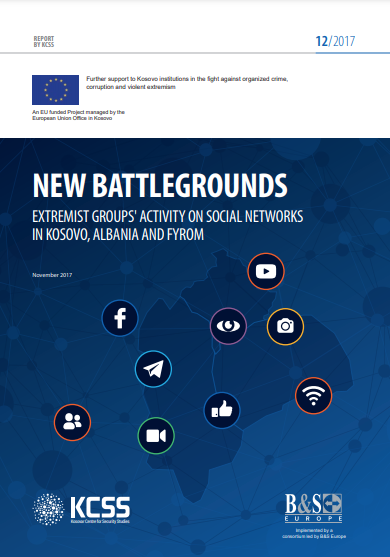30/11/2017

Kosovar Center for Security Studies (KCSS)
EU Office in Kosovo
Vesë Kelmendi, Shpat Balaj
Online platforms are used extensively as a propaganda tool to convince young people to support the various groups fighting in Iraq and Syria. Many individuals outside of the conflict partake in propaganda efforts on social media, using their profiles to provide electronic support to ISIS and other extremist groups. An analysis of various profiles indicates that those engaged in the Syria conflict use their profile to disseminate information about the conflict, which can be used for propaganda. The typical feature observed across these profiles is the virtual association between them. Websites and profiles that share the online propaganda of extremist groups have been identified in Kosovo, Former Yugoslav Republic of Macedonia (FYROM) and Albania. The distribution of this propaganda in the Albanian language by ISIS and other organizations has increased support for the so-called “Islamic State”.
Research on the social network activities of these various groups aims to explain the discourse of online sites that primarily promote ISIS, the content of these pages, their attitudes towards democratic processes such as elections and employment in secular state institutions, other religious communities, and state security institutions, as well as sermons on jihad and support for prominent members of various violent extremist groups.
The methodology employed during the course of the research for this report involved the analysis of data and information gathered from within ‘closed’ websites and social media groups/networks that are only accessible by invitation. The interactions within these ‘closed’ groups are more honest and less guarded than would be the case with an unrestricted, publicly viewable page. A precise description of the methodology has deliberately been avoided in order to prevent counter-measures being taken by the administrators of these closed groups. As will be made clear, this report is intended to mark the beginning on an ongoing process of monitoring of online radicalization in the Albanian language.
The research is primarily based on three categories of online content: (i) extremist groups that are pro-violence; (ii) propaganda material, such as calls for jihad or for support for imprisoned imams; and (iii) trends and attitudes towards the state, institutions and society in general. To understand the importance of the Internet, namely of social network sites such as Facebook, YouTube and others, we have also analyzed some of the interviews of individuals formerly engaged in the conflict in Syria and Iraq. According to the interviewees, most of them used Facebook and YouTube to become informed of the conflicts in Syria and Iraq, which is different compared to the online propaganda which was spread in EU member states, where twitter was used mostly.1 Moreover, the distressing images of civilians in Syria, the idea of assuming protagonism in “creating Caliphate” to fight for Jihad” led to a number of individuals having an active role in the media. Their narrative echoes protection of Islam by repeatedly referring to what they call ‘crusaders’ as well as prioritizing their enemies such as Jews, Alewite communities and traditional preachers of Islam.
The Kosovar Centre for Security Studies (KCSS) has created a database that includes Facebook pages, YouTube channels and other sites promoting violence or propaganda about ISIS and other terrorist organizations. These pages represent calls to join fights in Syria and Iraq and make “jihad” and to be “soldiers of Allah”. The analysis of these Albanian language sites was conducted from December 2016 until May 2017. 60 Facebook pages, 4 closed groups and over 120 individual profiles and 6 YouTube channels were analyzed.
This report is published in the framework of the project “Further support to Kosovo institutions in the fight against organized crime, corruption and violent extremism” supported by EU funded Project managed by the European Union Office in Kosovo and Implemented by a consortium led by B&S Europe.